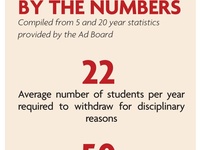The required withdrawal is in line with the Ad Board’s principle of pedagogical discipline, in which disciplinary actions are ultimately meant to be educational, rather than punitive, according to Ellison.
“Just having time to actually think about what they want from an education...is pretty unequivocally valuable,” says Adams House Resident Dean Sharon L. Howell. “I wish everyone would take a term off and think about that.”
But some students contend that required withdrawal is a flawed disciplinary response, as well as an ineffective educational measure.
Though Jeff—the student who had to withdraw after failing two courses—agrees that his removal from campus gave him the chance to gain fresh perspectives, he nevertheless says that required withdrawal is a “fundamentally stupid” process.
“It seems like its the default response to anything the [Ad Board] sees,” Jeff says. “But there was just a real failure to engage with the causes of [the original problem].”
The prevalence of the required withdrawal response is indicative of a “disconnect” between the Board and other offices in the College, such as the Bureau of Study Council—which could have been a far more effective on-campus resource for his academic problems, Jeff says.
“My year off didn’t really make me want to [do work for my classes] any more than before,” he says. “It just made me realize that the consequences are so bad that I never want to not [do work] again.”
While he was on the Committee, former Undergraduate Council President Matthew L. Sundquist ’09 says he had heard many “mixed messages” about the quality of students’ required withdrawal experiences: “I would say most students found the process to be confusing,” he says.
The discrepancy between the Ad Board’s perceptions about the effectiveness of required withdrawal and the negative accounts of some students may be, in part, the result of the Board’s primary source of information.
The Board mainly receives feedback on the withdrawal process through personal statements that students are required to submit to be considered for readmission to the College. But these evaluations may not be entirely reliable.
“I wrote all this bullshit about how I realized what a luxury academic study was,” Jeff says of his readmission statement. “It was true to a certain extent...but I absolutely omitted everything I thought [the Ad Board] didn’t want to hear.”
Ellison admits that students may feel pressured to write what they believe will cast them in a positive light for readmission, a position echoed by Sundquist.
“When...the reason for writing the statement is to be readmitted to the College, I think you can sometimes suspect and conclude that [students] are willing to take a one-sided view of facts,” Sundquist says. “I would too, if I were writing that statement.”
A GREATER RANGE OF DISCIPLINARY MEASURES
Recommendations from the recently released Report from the Committee to Review the Ad Board propose that the Ad Board be given a wider array of disciplinary responses to cases of academic dishonesty—including actions less drastic than required withdrawal, such as a penalty to a student’s grade.
Read more in News
Rapper Kid Cudi To Perform At YardfestRecommended Articles
-
Eliot House Masters To Step Down in JuneAfter a decade as Eliot House Masters, Lino Pertile and Anna Bensted announced they would step down this June in a Thanksgiving e-mail to the House's listserv.
-
 The Quad ATM Has Arrived
The Quad ATM Has Arrived -
 J-Term Journal: Fading to Black (Swan)
J-Term Journal: Fading to Black (Swan) -
 Fresh ‘Like Crazy’ Offers Realistic Romance
Fresh ‘Like Crazy’ Offers Realistic Romance -
 Fighting Pain with Pain
Fighting Pain with Pain -
 Love & Earl Grey
Love & Earl Grey














